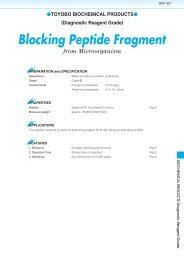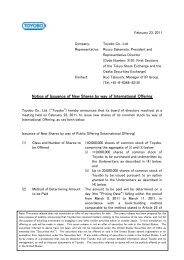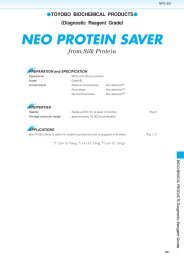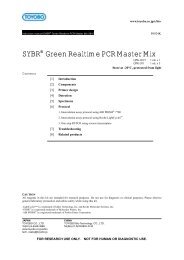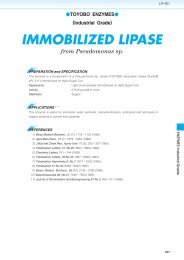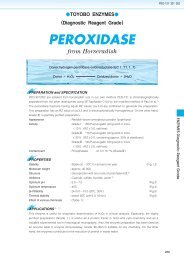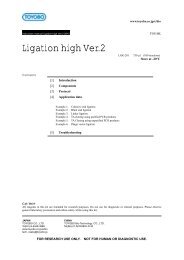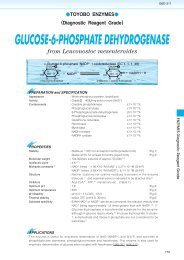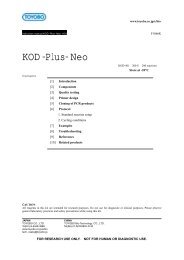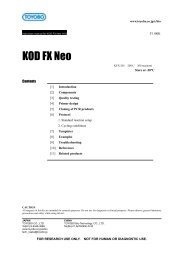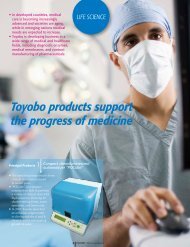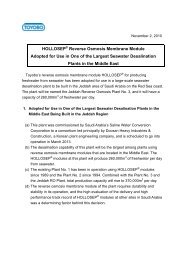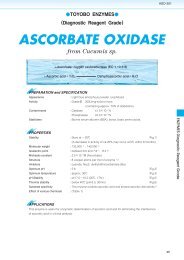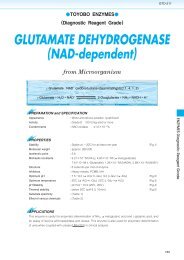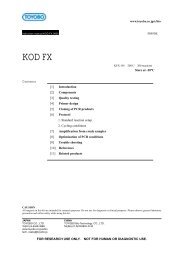THUNDERBIRD™ SYBR® qPCR Mix - Toyobo
THUNDERBIRD™ SYBR® qPCR Mix - Toyobo
THUNDERBIRD™ SYBR® qPCR Mix - Toyobo
Create successful ePaper yourself
Turn your PDF publications into a flip-book with our unique Google optimized e-Paper software.
JAPAN CHINA<br />
TOYOBO CO., LTD. TOYOBO Bio-Technology, CO., LTD.<br />
Tel(81)-6-6348-3888 Tel(86)-21-58794900.4140<br />
www.toyobo.co.jp/e/bio<br />
tech_osaka@toyobo.jp<br />
www.toyobo.co.jp/e/bio<br />
Instruction manual THUNDERBIRD SYBR <strong>qPCR</strong> <strong>Mix</strong> 0910 A4251K<br />
THUNDERBIRD SYBR ® <strong>qPCR</strong> <strong>Mix</strong><br />
QPS-201T 1 mL x 1<br />
QPS-201 1.67 mL x 3<br />
Contents<br />
[1] Introduction<br />
[2] Components<br />
[3] Primer design<br />
[4] Template DNA<br />
[5] Protocol<br />
1. Standard reaction set up<br />
2. Cycling condition<br />
2-1. Real-time PCR conditions using Applied Biosystems 7900HT<br />
2-2. Real-time PCR conditions using Roche LightCycler 1.1<br />
2-3. 3-step cycle<br />
[6] Related Protocol<br />
cDNA synthesis<br />
[7] Troubleshooting<br />
[8] Related products<br />
Store at -20°C, protected from light<br />
CAUTION<br />
All reagents in this kit are intended for research purposes. Do not use for diagnosis or clinical purposes. Please observe<br />
general laboratory precaution and utilize safety while using this kit.<br />
-LightCycler is a trademark of Idaho Technology, Inc. and Roche Molecular Systems, Inc.<br />
-SYBR ® is a registered trademark of Roche Molecular Systems, Inc.<br />
.<br />
FOR RESEARCH USE ONLY. NOT FOR HUMAN OR DIAGNOSTIC USE.<br />
1
[ 1 ] Introduction<br />
[ 2 ] Components<br />
Description<br />
JAPAN CHINA<br />
TOYOBO CO., LTD. TOYOBO Bio-Technology, CO., LTD.<br />
Tel(81)-6-6348-3888 Tel(86)-21-58794900.4140<br />
www.toyobo.co.jp/e/bio<br />
tech_osaka@toyobo.jp<br />
www.toyobo.co.jp/e/bio<br />
THUNDERBIRD SYBR ® <strong>qPCR</strong> <strong>Mix</strong> is a highly efficient 2x Master <strong>Mix</strong> for real-time<br />
PCR using SYBR ® Green I. The master mix contains all required components, except<br />
ROX reference dye and primers (50x ROX reference dye is individually supplied with<br />
this kit). The master mix facilitates reaction setup, and improves the reproducibility of<br />
experiments.<br />
This product is an improved version of Realtime PCR Master <strong>Mix</strong> (Code No. QPK-201)<br />
and Realtime PCR Master <strong>Mix</strong> -Plus- (Code No. QPK-212). In particular, the reaction<br />
specificity and PCR efficiency is enhanced.<br />
Features<br />
-High specificity<br />
The specificity for the detection of low-copy targets is improved.<br />
-Homogeneous amplification<br />
The dispersion of PCR efficiency between targets is reduced by a new PCR enhancer*.<br />
(*Patent pending)<br />
-Broad dynamic range<br />
High specificity and effective amplification enable the detection of a broad dynamic<br />
range.<br />
-Compatibility for various real-time cyclers.<br />
The reagent is applicable to most real-time cyclers (i.e. Block type and glass capillary<br />
type). Because the 50x ROX reference dye is individually supplied with this kit, the kit<br />
can be applied to real-time cyclers that require a passive reference dye.<br />
-Hot start PCR<br />
The master mix contains anti-Taq DNA polymerase antibodies for hot start technology.<br />
The antibodies are easily inactivated in the first denaturation step, thereby activating the<br />
DNA polymerase.<br />
About the SYBR ® Green I detection system<br />
The SYBR ® Green I assay system utilizes fluorescent emission when SYBR ® Green is<br />
intercalated into double-stranded DNA. The signal depends on the amount of amplified<br />
DNA. However, this system cannot distinguish between target and non-specific<br />
amplicons. Therefore, melting curve analysis is necessary after amplification.<br />
This kit includes the following components for 40 reactions (QPS-201T) and 200<br />
reactions (QPS-201), with a total of 50 μl per reaction. All reagents should be stored at<br />
-20 °C.<br />
<br />
THUNDERBIRD SYBR ® <strong>qPCR</strong> <strong>Mix</strong> 1 ml x 1<br />
50xROX reference dye 50 μl x 1<br />
FOR RESEARCH USE ONLY. NOT FOR HUMAN OR DIAGNOSTIC USE.<br />
1
[ 3 ] Primer design<br />
<br />
THUNDERBIRD SYBR ® <strong>qPCR</strong> <strong>Mix</strong> 1.67 ml x 3<br />
50xROX reference dye 250 μl x 1<br />
JAPAN CHINA<br />
TOYOBO CO., LTD. TOYOBO Bio-Technology, CO., LTD.<br />
Tel(81)-6-6348-3888 Tel(86)-21-58794900.4140<br />
www.toyobo.co.jp/e/bio<br />
tech_osaka@toyobo.jp<br />
www.toyobo.co.jp/e/bio<br />
Notes:<br />
-THUNDERBIRD SYBR ® <strong>qPCR</strong> <strong>Mix</strong> can be stored, protected from light, at 2-8°C for<br />
up to 3 months. For longer storage, this reagent should be kept at -20°C and protected<br />
from light. No negative effect was detected by 10 freeze-thaw cycles of<br />
THUNDERBRID SYBR ® <strong>qPCR</strong> <strong>Mix</strong>. This reagent does not contain the ROX<br />
reference dye.<br />
-50x ROX reference dye can be stored, protected from light, at 2-8°C or -20°C. For<br />
real-time cyclers that require a passive reference dye, this reagent must be added to the<br />
reaction mixture at a concentration of 1x or 0.1x. The master mix solution with the ROX<br />
reference dye can be stored, protected from light, at 2-8°C for up to 3 months. For longer<br />
storage, this reagent should be kept at -20°C and protected from light. The pre-mixed<br />
reagents can be prepared according to the following ratios. [5] Table 1 shows the optimal<br />
concentration of the ROX dye.<br />
1x Solution<br />
THUNDERBIRD SYBR ® <strong>qPCR</strong> <strong>Mix</strong> : 50xROX reference dye = 1.67 ml : 66.8 μl<br />
THUNDERBIRD SYBR ® <strong>qPCR</strong> <strong>Mix</strong> : 50xROX reference dye = 1 ml : 40 μl<br />
0.1x Solution<br />
THUNDERBIRD SYBR ® <strong>qPCR</strong> <strong>Mix</strong> : 50xROX reference dye = 1.67 ml : 6.7 μl<br />
THUNDERBIRD SYBR ® <strong>qPCR</strong> <strong>Mix</strong> : 50xROX reference dye = 1 ml : 4 μl<br />
For real-time cyclers that do not require a passive reference dye, THUNDERBIRD<br />
SYBR ® <strong>qPCR</strong> <strong>Mix</strong> without the ROX reference dye can be used.<br />
1. Primer conditions<br />
Highly sensitive and quantitative data depend on primer design. The primer should be<br />
designed according to the following suggestions;<br />
-Primer length: 20-30 mer<br />
-GC content of primer: 40-60%<br />
-Target length: ≤ 200 bp (optimally, 80-150 bp)<br />
-Melting temperature (Tm) of primers: 60-65°C<br />
-Purification grade of primers: Cartridge (OPC) grade or HPLC grade<br />
Notes:<br />
-Longer targets (>200 bp) reduce efficiency and specificity of amplification.<br />
-Tm of the primers can be flexible, because the Tm value depends on the calculation<br />
formula.<br />
FOR RESEARCH USE ONLY. NOT FOR HUMAN OR DIAGNOSTIC USE.<br />
2
[ 4 ] Template DNA<br />
[ 5 ] Protocol<br />
The following DNA samples can be used as templates.<br />
1. cDNA<br />
JAPAN CHINA<br />
TOYOBO CO., LTD. TOYOBO Bio-Technology, CO., LTD.<br />
Tel(81)-6-6348-3888 Tel(86)-21-58794900.4140<br />
www.toyobo.co.jp/e/bio<br />
tech_osaka@toyobo.jp<br />
www.toyobo.co.jp/e/bio<br />
Non-purified cDNA, generated by reverse transcription reactions, can be used directly for<br />
real-time PCR using THUNDERBIRD SYBR ® <strong>qPCR</strong> <strong>Mix</strong>. Up to 10% of the volume<br />
of a cDNA solution can be used for a real-time PCR reaction. However, excess volume of<br />
the cDNA may inhibit the PCR. Up to 20% (v/v) of the cDNA solution from ReverTra<br />
Ace ® <strong>qPCR</strong> RT Kit (Code No. FSQ-101) can be used for real-time PCR.<br />
2. Genomic DNA, Viral RNA<br />
Genomic DNA and viral RNA can be used at up to 200 ng in 50 μl reactions.<br />
3. Plasmid DNA<br />
Although super-coiled plasmids can be used, linearized plasmid DNA produces more<br />
accurate assays. The copy number of the plasmid DNA can be calculated by the<br />
following formula.<br />
Copy number of 1μg of plasmid DNA = 9.1 x 10 11 / Size of plasmid DNA (kb)<br />
1. Reaction mixture setup<br />
Reaction volume Final<br />
Reagent 50μl 20μl Concentration<br />
DW X μl X μl<br />
THUNDERBIRD SYBR ® <strong>qPCR</strong> <strong>Mix</strong> 25 μl 10 μl 1x<br />
Forward Primer 15 pmol 6 pmol 0.3 μM *1<br />
Reverse Primer 15 pmol 6 pmol 0.3 μM *1<br />
50X ROX reference dye 1μl / 0.1μl 0.4μl / 0.04μl 1x / 0.1x *2<br />
DNA solution Y μl Y μl<br />
Total 50 μl 20 μl<br />
FOR RESEARCH USE ONLY. NOT FOR HUMAN OR DIAGNOSTIC USE.<br />
3
JAPAN CHINA<br />
TOYOBO CO., LTD. TOYOBO Bio-Technology, CO., LTD.<br />
Tel(81)-6-6348-3888 Tel(86)-21-58794900.4140<br />
www.toyobo.co.jp/e/bio<br />
tech_osaka@toyobo.jp<br />
www.toyobo.co.jp/e/bio<br />
Notes:<br />
*1 Higher primer concentration tends to improve the amplification efficiency, and lower<br />
primer concentration tends to reduce the non-specific amplification. The primer<br />
concentration should be set between 0.2-0.6 μM.<br />
*2 50xROX reference dye must be added when using real-time cyclers that require a<br />
passive reference dye, according to Table 1. Table 1 shows the optimum concentration<br />
of the ROX reference dye. This dye is not necessary for real-time cyclers that do not<br />
require a passive reference dye.<br />
Table 1 Recommended ROX dye concentration<br />
Real-time cycler Optimal dye concentration<br />
(dilution ratio)<br />
Applied Biosystems 7000, 7300, 7700, 7900HT etc. 1x (50:1)<br />
Applied Biosystems 7500, 7500Fast,<br />
0.1x (500:1)<br />
Stratagene cyclers (Option) etc.<br />
Roche cyclers, Bio-Rad cyclers, BioFlux cyclers etc. Not required<br />
Notes:<br />
The ROX dye in SYBR ® Green Realtime PCR Master <strong>Mix</strong> (Code No. QPK-201) and<br />
SYBR ® Green Realtime PCR Master <strong>Mix</strong> -Plus- (Code No. QPK-212) correspond to 1x<br />
concentration.<br />
2. PCR cycling conditions<br />
The following table shows the recommended thermal conditions using primers designed<br />
according to the recommended primer described in [3]. Almost all targets can also be<br />
amplified using the ongoing conditions with other real-time PCR reagents.<br />
When satisfactory results are not obtained or the Tm value of the primers is lower than<br />
60°C, a 3-step cycle should be used. The detailed conditions are described in [5] 2-3.<br />
Temperature Time Ramp<br />
Pre-denaturation 95°C 20-60 sec *1 . Maximum<br />
Denaturation: 95°C 1-15 sec *2 . Maximum<br />
Melting / Dissociation Curve Analysis *5<br />
Extension: 60°C *3 30-60 sec *4 . Maximum<br />
(data collection should be set at the extension step)<br />
*1 Due to the anti-Taq antibody hot start PCR system, the pre-denaturation can be<br />
completed within 60 sec. The pre-denaturation time should be determined according<br />
to the recommendations of each real-time cycler. If the optimal pre-denaturation time<br />
cannot be determined, the time should be set at 60 sec.<br />
FOR RESEARCH USE ONLY. NOT FOR HUMAN OR DIAGNOSTIC USE.<br />
40 cycles<br />
4
JAPAN CHINA<br />
TOYOBO CO., LTD. TOYOBO Bio-Technology, CO., LTD.<br />
Tel(81)-6-6348-3888 Tel(86)-21-58794900.4140<br />
www.toyobo.co.jp/e/bio<br />
tech_osaka@toyobo.jp<br />
www.toyobo.co.jp/e/bio<br />
Table 2 The recommended pre-denaturation time on each real-time cyclers<br />
Real-time cycler Pre-denaturation time<br />
High speed cycler (e.g. Applied Biosystems 7500Fast) 20 sec<br />
Capillary cycler (e.g. Roche LightCycler 1.x, 2.0) 30 sec<br />
General real-time cyclers (Applied Biosystems 7700, 7500, 60 sec<br />
7900HT (normal block), Stratagene cyclers, BioFlux<br />
cyclers<br />
*2 The following table shows the optimal denaturation times for each real-time cycler. If<br />
the optimal denaturation time cannot be determined, the time should be set at 15 sec.<br />
Table 3 The recommended denaturation time on each real-time cyclers<br />
Real-time cycler Pre-denaturation time<br />
High speed cycler (e.g. Applied Biosystems 7500Fast) 3 sec<br />
Capillary cycler (e.g. Roche LightCycler 1.x, 2.0) 5 sec<br />
General real-time cyclers (Applied Biosystems 7700, 7500, 15 sec<br />
7900HT (normal block), Stratagene cyclers, BioFlux<br />
cyclers<br />
*3 Insufficient amplification may be improved by decreasing the extension temperature,<br />
and non-specific amplification (e.g. abnormal shapes of the amplification curve at low<br />
template concentrations) may be reduced by increasing the extension temperature. The<br />
extension temperature should be set at 56-64°C.<br />
*4 If the target size is smaller than 300 bp, the extension time can be set at 30 sec on<br />
almost all real-time cyclers. Instability of the amplification curve or variation of data<br />
from each well may be improved by setting the extension time at 45-60 sec. Some<br />
real-time cyclers or software need over 30 sec for the extension step. In these cases, the<br />
time should be set according to each instruction manual (e.g. Applied Biosystems<br />
7000/73000: ≥ 31 sec; Applied Biosystems 7500: ≥ 35 sec.).<br />
*5<br />
The melting curve analysis should be performed according to the recommendations of<br />
each real-time cycler.<br />
FOR RESEARCH USE ONLY. NOT FOR HUMAN OR DIAGNOSTIC USE.<br />
5
JAPAN CHINA<br />
TOYOBO CO., LTD. TOYOBO Bio-Technology, CO., LTD.<br />
Tel(81)-6-6348-3888 Tel(86)-21-58794900.4140<br />
www.toyobo.co.jp/e/bio<br />
tech_osaka@toyobo.jp<br />
www.toyobo.co.jp/e/bio<br />
2-1. Real-time PCR conditions using Applied Biosystems 7900HT<br />
(Normal block type, software version 2.2.2)<br />
The following is an example of a SYBR ® Green I assay using Applied Biosystems<br />
7900HT.<br />
(1) The cycling parameters should be set according to the following “Thermal Cycler<br />
Protocol” window under the “Instrument” tab. When adding the melting curve<br />
analysis, click the “Add Dissociation Stage” button.<br />
Notes:<br />
- Appropriate sample volumes should be set.<br />
- ≥ 45 sec is necessary for the extension step.<br />
(2) Click the “Data collection” tab.<br />
(3) Insert the PCR plate<br />
(4) Start the program<br />
FOR RESEARCH USE ONLY. NOT FOR HUMAN OR DIAGNOSTIC USE.<br />
6
2-2. Real-time PCR conditions using Roche LightCycler 1.1<br />
(Software version 3.5)<br />
JAPAN CHINA<br />
TOYOBO CO., LTD. TOYOBO Bio-Technology, CO., LTD.<br />
Tel(81)-6-6348-3888 Tel(86)-21-58794900.4140<br />
www.toyobo.co.jp/e/bio<br />
tech_osaka@toyobo.jp<br />
www.toyobo.co.jp/e/bio<br />
The following is an example of a SYBR ® Green I assay using Roche LightCycler 1.1.<br />
(1) The cycling parameters should be set according to the following window. Analysis<br />
and Acquisition mode of the initial denaturation step must be set at “None”.<br />
(2) The cycling parameters should be set according to the following window. Analysis<br />
mode of the PCR step must be set at “Quantification”. And Acquisition modes of<br />
95°C and 60°C must be set at “None” and “Single”, respectively.<br />
FOR RESEARCH USE ONLY. NOT FOR HUMAN OR DIAGNOSTIC USE.<br />
7
JAPAN CHINA<br />
TOYOBO CO., LTD. TOYOBO Bio-Technology, CO., LTD.<br />
Tel(81)-6-6348-3888 Tel(86)-21-58794900.4140<br />
www.toyobo.co.jp/e/bio<br />
tech_osaka@toyobo.jp<br />
www.toyobo.co.jp/e/bio<br />
(3) [Melting curve analysis] The cycling parameters should be set according to the<br />
following window. The analysis mode must be set at “Melting curves”. Acquisition<br />
modes of 95°C (first) and 65°C must be set at “Non”. Acquisition mode of the<br />
second 95°C must be set at “CONT”.<br />
(4) The cycling parameters should be set according to the following window. Analysis<br />
and Acquisition mode of the cooling step must be set at “Non”.<br />
(5) Insert the capillaries in the carousel, and start the cycling program.<br />
FOR RESEARCH USE ONLY. NOT FOR HUMAN OR DIAGNOSTIC USE.<br />
8
2-3. 3-step cycle<br />
JAPAN CHINA<br />
TOYOBO CO., LTD. TOYOBO Bio-Technology, CO., LTD.<br />
Tel(81)-6-6348-3888 Tel(86)-21-58794900.4140<br />
www.toyobo.co.jp/e/bio<br />
tech_osaka@toyobo.jp<br />
www.toyobo.co.jp/e/bio<br />
In the event of the 2-step cycle failing, the following 3-step cycle may improve results. In<br />
the following cases, the 3-step cycle conditions may improve the result efficiently.<br />
-The Tm of the primer is lower than 60°C.<br />
-The target is longer than 300 bp.<br />
-PCR efficiency is low.<br />
Temperature Time Ramp<br />
Pre-denaturation 95°C 20-60 sec *1 . Maximum<br />
Denaturation: 95°C 1-15 sec *1 . Maximum<br />
55-65°C *2 5-30 sec *3 Maximum<br />
Melting / Dissociation Curve Analysis *5<br />
Extension: 72°C 30-60 sec *4 .<br />
(data collection should be set at the extension step)<br />
*1 The denaturation step should be determined according to [5] 2.<br />
*2<br />
The annealing temperature should be set at primer’s Tm-5°C. A higher annealing<br />
temperature may improve non-specific amplification.<br />
*3 The annealing time should be set at 5 sec (Fast cycler), 15 sec (Normal cycler). Shorter<br />
annealing times may reduce non-specific amplification. Longer annealing times (up to<br />
30 sec) may increase the PCR efficiency when the efficiency is low.<br />
*4 Shorter targets (≤300 bp) require shorter extension times (≤30 sec). However, certain<br />
cyclers require >30 sec detection time at the extension step. An unstable signal may be<br />
improved by prolonging the extension time up to 40-60 sec. Also note that some<br />
cyclers cannot have an extension time of 30 sec (Applied Biosystems 7000, 7300: ≥<br />
31 sec, 7500: ≥35 sec)<br />
*5<br />
The melting curve analysis should be performed according to each cycler’s<br />
recommendations.<br />
FOR RESEARCH USE ONLY. NOT FOR HUMAN OR DIAGNOSTIC USE.<br />
40 cycles<br />
9
[ 6 ] Related Protocol<br />
1. cDNA synthesis<br />
JAPAN CHINA<br />
TOYOBO CO., LTD. TOYOBO Bio-Technology, CO., LTD.<br />
Tel(81)-6-6348-3888 Tel(86)-21-58794900.4140<br />
www.toyobo.co.jp/e/bio<br />
tech_osaka@toyobo.jp<br />
www.toyobo.co.jp/e/bio<br />
cDNA synthesized by various cDNA synthesis reagents can be used with<br />
THUNDERBIRD SYBR ® <strong>qPCR</strong> <strong>Mix</strong>. However, cDNA synthesized by a reagent<br />
specialized for real-time PCR can increase sensitivity.<br />
ReverTra Ace ® <strong>qPCR</strong> RT Kit (Code No. FSQ-101) is a cDNA synthesis kit suitable for<br />
real-time PCR. Here, the protocol with ReverTra Ace ® <strong>qPCR</strong> RT Kit is described.<br />
However, for the detailed protocol, please refer to the instruction manual of the kit.<br />
(1) Denaturation of RNA<br />
Incubate the RNA solution at 65°C for 5 min and then chill on ice.<br />
Notes:<br />
-This step can be omitted. But this step may increase the efficiency of the reverse<br />
transcription of RNA, which forms secondary structures.<br />
-Do not add 5x RT Buffer and/or enzyme solution at this step.<br />
(2) Preparation of the reaction solution<br />
Reagent Volume (amount)<br />
Nuclease-free Water X µl<br />
5x RT Buffer 2 µl<br />
Primer <strong>Mix</strong> 0.5 µl<br />
Enzyme <strong>Mix</strong> 0.5 µl<br />
RNA solution 0.5 pg-1 µg<br />
Total 10 µl<br />
(3) Reverse transcription reaction<br />
-Incubate at 37°C for 15 min. <br />
-Heat at 98°C for 2 min. <br />
-Store at 4°C or -20°C.*<br />
*This solution can be used in the real-time PCR reaction directly or after dilution.<br />
Notes:<br />
The above temperature conditions are optimized for ReverTra Ace ® <strong>qPCR</strong> RT Kit.<br />
FOR RESEARCH USE ONLY. NOT FOR HUMAN OR DIAGNOSTIC USE.<br />
10
[ 7 ] Troubleshooting<br />
Symptom Cause Solution<br />
Loss of linearity in the<br />
high cDNA/DNA<br />
concentration region.<br />
Lost of linearity or<br />
lower signal in the low<br />
DNA/cDNA<br />
Intercalation of SYBR ® Green I into<br />
the template DNA.<br />
JAPAN CHINA<br />
TOYOBO CO., LTD. TOYOBO Bio-Technology, CO., LTD.<br />
Tel(81)-6-6348-3888 Tel(86)-21-58794900.4140<br />
www.toyobo.co.jp/e/bio<br />
tech_osaka@toyobo.jp<br />
www.toyobo.co.jp/e/bio<br />
Because SYBR ® Green I is also intercalated into<br />
the template DNA, the base line tends to be<br />
higher when high concentration DNA samples are<br />
used. Diluted template should be used to obtain a<br />
correct Ct value.<br />
The template DNA is insufficient. When the DNA/cDNA copy number is lower than<br />
10 copies per reaction, the linearity of the reaction<br />
tends to be lost. The template concentration<br />
Adsorption of the DNA to the tube<br />
wall.<br />
concentration region. Competition with primer dimer<br />
formation.<br />
Loss of linearity of the<br />
amplification carves.<br />
Competition with non-specific<br />
amplification.<br />
should be increased.<br />
The diluted DNA templates tend to be absorbed<br />
onto the tube wall. Dilution should be performed<br />
just prior to experiments.<br />
Dimer formation may reduce the amplification<br />
efficiency of the target, especially for reactions at<br />
low template concentration. The reaction<br />
condition should be optimized or the primer<br />
sequences should be changed.<br />
Non-specific amplification may reduce the<br />
amplification efficiency of the target. The reaction<br />
conditions should be optimized or the primer<br />
sequences should be changed.<br />
The PCR efficiency is Inappropriate cycling conditions. Optimize the cycling conditions according to [5].<br />
lower than 90% (slope: Degradation of the primers. Fresh primer solution should be prepared.<br />
Symptom Cause Solution<br />
Amplification from the<br />
non-template control<br />
(NTC).<br />
Low amplification<br />
curve signal /<br />
Unstable amplification<br />
curve signal.<br />
Detection of multiple<br />
peaks on the melting<br />
curve analysis<br />
JAPAN CHINA<br />
TOYOBO CO., LTD. TOYOBO Bio-Technology, CO., LTD.<br />
Tel(81)-6-6348-3888 Tel(86)-21-58794900.4140<br />
www.toyobo.co.jp/e/bio<br />
tech_osaka@toyobo.jp<br />
www.toyobo.co.jp/e/bio<br />
Formation of primer dimer. On the melting curve analysis, a peak at a<br />
temperature lower than that of the target peak<br />
suggests a primer dimer. The PCR cycle should be<br />
optimized according to [4] (2). If the result is not<br />
improved, the following should be<br />
performed:change the primer sequence and/or<br />
change the purification grade of the primer<br />
Contamination or carry over of the<br />
PCR products.<br />
Excessive amount of ROX reference<br />
dye.<br />
(HPLC grade)<br />
When the no-template control generates a peak at<br />
the same melting temperature as the target on the<br />
melting curve analysis, the amplification is caused<br />
by a carry-over or contamination. Use fresh<br />
reagents.<br />
Excessive amount of ROX reference dye may<br />
cause low signal. 50x ROX reference dye should<br />
be used according to [5] Table 1.<br />
Settings should be confirmed according to the<br />
Inappropriate settings of<br />
fluorescence measurement<br />
instruction manual of each detector.<br />
Insufficient reaction volume. Low reaction volume may cause an unstable<br />
signal. Increase the reaction volume.<br />
Non-specific amplification. Optimize the reaction conditions. If the result is<br />
not improved, the primer sequence should be<br />
changed.<br />
Formation of primer dimer. On the melting curve analysis, a peak at a<br />
temperature lower than that of the target peak<br />
suggests a primer dimer. The PCR cycle should be<br />
optimized according to [4] (2). If the result is not<br />
improved, the following action should be<br />
performed:change the primer sequence and/or<br />
change the purification grade of the primer<br />
(HPLC grade)<br />
FOR RESEARCH USE ONLY. NOT FOR HUMAN OR DIAGNOSTIC USE.<br />
12
[ 8 ] Related products<br />
JAPAN CHINA<br />
TOYOBO CO., LTD. TOYOBO Bio-Technology, CO., LTD.<br />
Tel(81)-6-6348-3888 Tel(86)-21-58794900.4140<br />
www.toyobo.co.jp/e/bio<br />
tech_osaka@toyobo.jp<br />
www.toyobo.co.jp/e/bio<br />
Product name Package Code No.<br />
High efficient real-time PCR master mix<br />
200 QPS-201<br />
THUNDERBIRD Probe <strong>qPCR</strong> <strong>Mix</strong><br />
reactions<br />
High efficient cDNA synthesis kit for real-time PCR<br />
ReverTra Ace ® 200 FSQ-101<br />
<strong>qPCR</strong> RT Kit<br />
reactions<br />
One-step Real-time PCR master mix for probe assay<br />
0.5 mL x 2 QRT-101T<br />
RNA-direct Realtime PCR Master <strong>Mix</strong><br />
0.5 mL x 5 QRT-101<br />
One-step Real-time PCR master mix for SYBR ® Green assay<br />
RNA-direct SYBR ® 0.5 mL x 2 QRT-201T<br />
Realtime PCR Master <strong>Mix</strong> 0.5 mL x 5 QRT-201<br />
FOR RESEARCH USE ONLY. NOT FOR HUMAN OR DIAGNOSTIC USE.<br />
13
JAPAN CHINA<br />
TOYOBO CO., LTD. TOYOBO Bio-Technology, CO., LTD.<br />
Tel(81)-6-6348-3888 Tel(86)-21-58794900.4140<br />
www.toyobo.co.jp/e/bio<br />
tech_osaka@toyobo.jp<br />
www.toyobo.co.jp/e/bio<br />
NOTICE TO PURCHASER: LIMITED LICENSE<br />
Use of this product is covered by one or more of the following US patents and corresponding patent claims outside the US: 5,079,352,<br />
5,789,224, 5,618,711, 6,127,155, 5,677,152, 5,773,258, 5,407,800, 5,322,770, 5,310,652, 5,994,056, 6,171,785, and claims outside the US<br />
corresponding to US Patent No. 4,889,818. The purchase of this product includes a limited, non-transferable immunity from suit under the<br />
foregoing patent claims for using only this amount of product for the purchaser’s own internal research. No right under any other patent<br />
claim (such as apparatus or system claims in US Patent No. 6,814,934) and no right to perform commercial services of any kind, including<br />
without limitation reporting the results of purchaser's activities for a fee or other commercial consideration, is conveyed expressly, by<br />
implication, or by estoppel. This product is for research use only. Diagnostic uses under Roche patents require a separate license from<br />
Roche. Further information on purchasing licenses may be obtained by contacting the Director of Licensing, Applied Biosystems, 850<br />
Lincoln Center Drive, Foster City, California 94404, USA.<br />
FOR RESEARCH USE ONLY. NOT FOR HUMAN OR DIAGNOSTIC USE.



